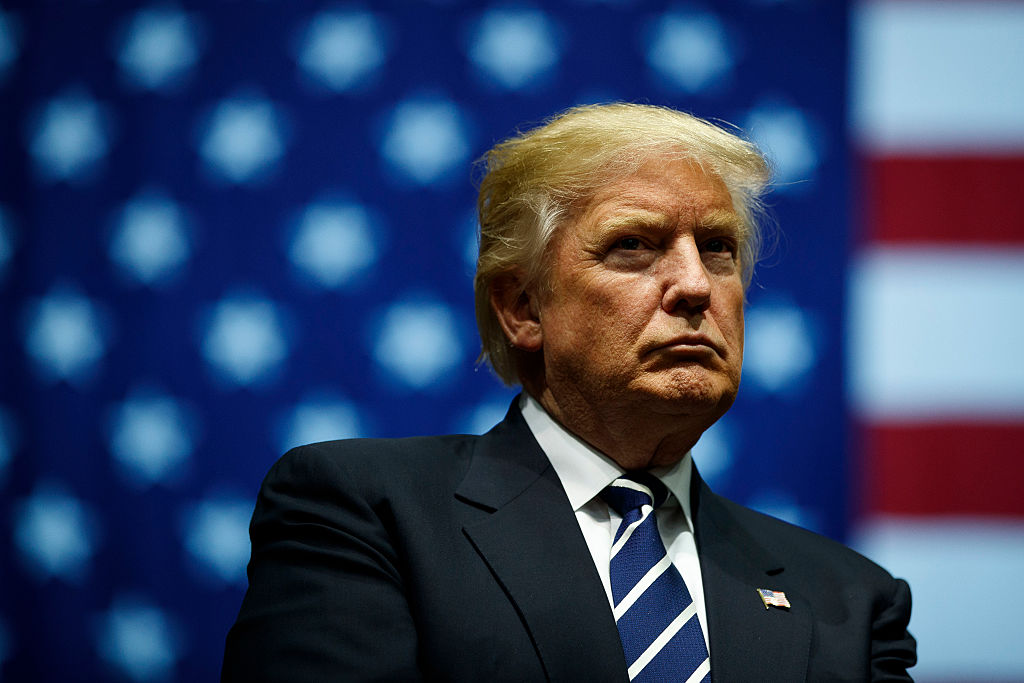Trump is emboldening racists. This will end disastrously.
Brace for more violence, America


A free daily email with the biggest news stories of the day – and the best features from TheWeek.com
You are now subscribed
Your newsletter sign-up was successful
The Trump presidency will end poorly. It's been evident from long before he officially announced his campaign that Donald Trump was catastrophically unfit for any government service, let alone the most powerful elected office in the country. The first seven months of his administration have been a cascading series of failures, scandals, and disasters, most of them self-made, and there's absolutely no reason to believe things will get better.
The man has little intelligence, even less empathy, no capacity for self-improvement, and monstrous beliefs. Every action he pursues is motivated by relentless self-interest and greed. He attracts the worst people to his banner, and the few people who've signed on for senior positions out of a high-minded call to service have been corrupted and humiliated. There is no happy ending to all of this.
All we're left to wonder at this point is just how bad it will get before it's over. The remarks Trump made on Tuesday afternoon regarding the weekend's deadly neo-Nazi violence in Charlottesville, Virginia, provided us a pretty clear answer: It will be extremely bad.
The Week
Escape your echo chamber. Get the facts behind the news, plus analysis from multiple perspectives.

Sign up for The Week's Free Newsletters
From our morning news briefing to a weekly Good News Newsletter, get the best of The Week delivered directly to your inbox.
From our morning news briefing to a weekly Good News Newsletter, get the best of The Week delivered directly to your inbox.
To recap: On Saturday, a white supremacist and domestic terrorist plowed his car through a group of counter-protesters in Charlottesville, killing one and injuring 19 others. Later that day, Trump delivered brief remarks on the attack in which he denounced the violence on "many sides," thus granting the Nazis and neo-Confederates who rampaged through the city the succor of false equivalence. After sustained outcry from the media and politicians of both parties, Trump appeared on camera again on Monday to denounce white supremacists in a statement that felt forced and perfunctory.
Then, on Tuesday, Trump revisited the events in Charlottesville and delivered one of the most foul series of remarks any president has made in public. He made a special point to blame the "alt-left" — a term that was invented by right-wing extremists to discredit left-wing groups that oppose them — for the violence in Charlottesville. "What about the alt-left that came charging at the, as you say, the alt-right?" Trump asked. "Do they have any semblance of guilt?"
Having shifted blame for the violence away from the neo-Nazis, the president then tried to paint a happy picture of the white supremacist protesters who staged an ersatz Nuremberg rally on the University of Virginia campus. "They were people protesting very quietly the taking down the statue of Robert E. Lee. I am sure in that group there were some bad ones … But you had a lot of people in that group that were there to innocently protest and very legally protest."
Those "quiet" and "innocent" protesters actually shouted the Nazi slogan "blood and soil," chanted "Jews will not replace us," and assaulted a peaceful counter-protest. But, in the president's eyes, the counter-protesters had committed their own atrocity. "They didn't have a permit," Trump said.
A free daily email with the biggest news stories of the day – and the best features from TheWeek.com
Trump's whole performance was shot-through with white supremacist talking points. He went out of his way to make excuses for fascists and other enemies of pluralism. He consciously and deliberately inflamed a crisis of racial violence. Predictably, high-profile white nationalists and leaders of the racist online right were thrilled with what the president of the United States had said about them.
Donald Trump has always been at his worst when race and bigotry are at issue. As a private citizen and as a presidential candidate, Trump was brusquely racist — he led the insane birther crusade against Barack Obama, he attacked Judge Gonzalo Curiel simply for being of Mexican descent, and he launched his presidential run by calling Mexican immigrants rapists. But Tuesday's press conference was different because Trump now inhabits the presidency. He brought the full weight and prestige of the office to bear in telling the country and the world that violent neo-Nazis are no worse than the people who protest them.
Behavior like this from the president is radicalizing. It gives a shot in the arm to the worst elements of the extreme right and it emboldens racists and wannabe fascists to emerge from their darkened recesses. More neo-Nazi rallies means more counter-protests, more volleys of racial slurs, and more militia members decked out in tactical gear with assault rifles slung across their chests. These people show up to rallies spoiling for a fight, and now they know that when violence breaks out, the president (and his supporters in conservative media) will help them out with a little "both sides" sleight of hand. This just breeds more conflict and more violence, which is precisely the opposite of what a president should be doing.
This aggressive exploitation of racial grievance is morally repugnant, but it's also central to Trump's character and his politics. It is the rotten core of his presidency and it will taint everything Trump touches for as long as he holds the office. Nothing good will come of this.
Simon Maloy is a political writer and researcher in Washington, DC. His work has been published by The Huffington Post, The American Prospect, and Salon.
-
 American universities are losing ground to their foreign counterparts
American universities are losing ground to their foreign counterpartsThe Explainer While Harvard is still near the top, other colleges have slipped
-
 How to navigate dating apps to find ‘the one’
How to navigate dating apps to find ‘the one’The Week Recommends Put an end to endless swiping and make real romantic connections
-
 Elon Musk’s pivot from Mars to the moon
Elon Musk’s pivot from Mars to the moonIn the Spotlight SpaceX shifts focus with IPO approaching
-
 The billionaires’ wealth tax: a catastrophe for California?
The billionaires’ wealth tax: a catastrophe for California?Talking Point Peter Thiel and Larry Page preparing to change state residency
-
 Bari Weiss’ ‘60 Minutes’ scandal is about more than one report
Bari Weiss’ ‘60 Minutes’ scandal is about more than one reportIN THE SPOTLIGHT By blocking an approved segment on a controversial prison holding US deportees in El Salvador, the editor-in-chief of CBS News has become the main story
-
 Has Zohran Mamdani shown the Democrats how to win again?
Has Zohran Mamdani shown the Democrats how to win again?Today’s Big Question New York City mayoral election touted as victory for left-wing populists but moderate centrist wins elsewhere present more complex path for Democratic Party
-
 Millions turn out for anti-Trump ‘No Kings’ rallies
Millions turn out for anti-Trump ‘No Kings’ ralliesSpeed Read An estimated 7 million people participated, 2 million more than at the first ‘No Kings’ protest in June
-
 Ghislaine Maxwell: angling for a Trump pardon
Ghislaine Maxwell: angling for a Trump pardonTalking Point Convicted sex trafficker's testimony could shed new light on president's links to Jeffrey Epstein
-
 The last words and final moments of 40 presidents
The last words and final moments of 40 presidentsThe Explainer Some are eloquent quotes worthy of the holders of the highest office in the nation, and others... aren't
-
 The JFK files: the truth at last?
The JFK files: the truth at last?In The Spotlight More than 64,000 previously classified documents relating the 1963 assassination of John F. Kennedy have been released by the Trump administration
-
 'Seriously, not literally': how should the world take Donald Trump?
'Seriously, not literally': how should the world take Donald Trump?Today's big question White House rhetoric and reality look likely to become increasingly blurred
